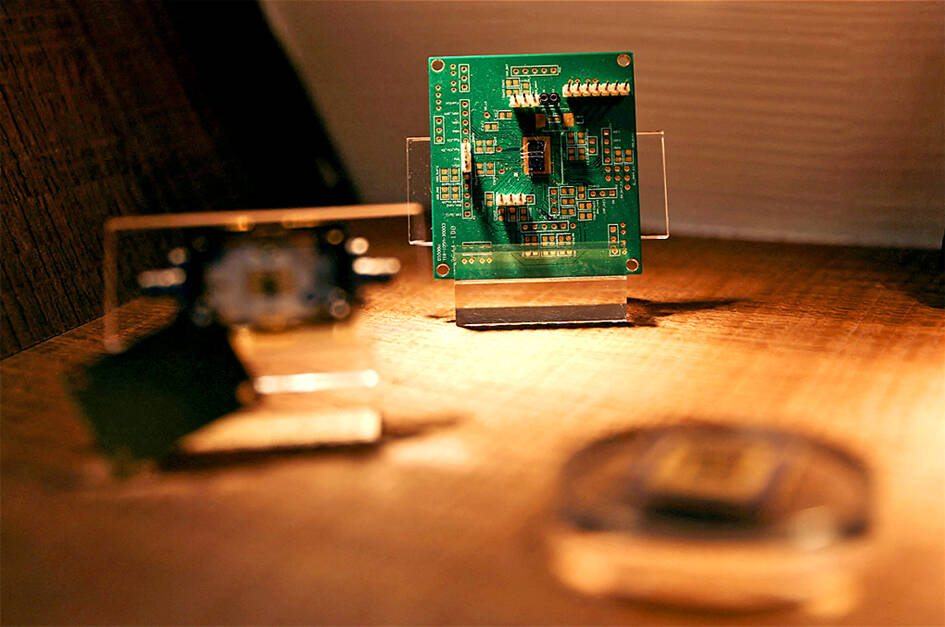Taiwan’s exports of integrated circuit (IC) chips last year rose for a seventh consecutive year, further solidifying the nation’s leadership status in a global semiconductor industry that has been roiled by US-China tensions and diversifying supply chains.
Exports of IC chips — which are pivotal components of electronic appliances, computers and smartphones — rose 18.4 percent year-on-year, the Ministry of Finance said.
It was also the third consecutive year of double-digit percentage growth.

Photo: Ann Wang, Reuters
“We believe Taiwan is irreplaceable in the near-term in the semiconductor industry,” Barclays PLC economist Bum Ki Son said in an e-mail to Bloomberg News.
Barclays said efforts by others, such as the US, to bolster chip production would not immediately have an effect on diminishing Taiwan’s importance.
Taiwan’s significance in the industry rests on the output of giants such as Taiwan Semiconductor Manufacturing Co (TSMC, 台積電), which has more than half of the market share in global semiconductor manufacturing, Son said — especially in the manufacturing of the world’s most cutting-edge chips.
Global sales of semiconductors have driven exports for Taiwan during a time when global trade has been under immense pressure from a worldwide drop-off in demand.
Also keeping Taiwan important to places such as the US are TSMC’s investment decisions, such as its landmark facility in Arizona, its first advanced chip plant in the US.
Son said the future of diversification in the industry would depend on where semiconductor fabrication plants are constructed.
Son cited potential plans for TSMC to build plants in Singapore and Japan, a recent Intel Corp investment in Vietnam, and India plans by Foxconn Technology Group (富士康科技集團) and Vedanta Resources Ltd as moves that might have lasting implications for the industry.
The outlook in the medium and long term is thus more “fluid, especially as US-China trade conflicts as well as COVID continue to underscore the vulnerability of concentrated supply chains,” Son said.
On top of the obvious risks of a direct conflict between superpowers, there is an economic dimension to the standoff. As home to the world’s largest chip maker, TSMC, Taiwan is critical to all kinds of global supply chains. Even an escalation short of war, such as a Chinese blockade, could set off a colossal domino effect.
A Chinese move against Taiwan, and the likely Western response, “is a contingency that everyone is planning for,” Institute of International Finance chief executive Tim Adams said.
“Every single firm is gaming out what those sanctions would look like, and who would be an ally to the US,” he said.

CHAOS: Iranians took to the streets playing celebratory music after reports of Khamenei’s death on Saturday, while mourners also gathered in Tehran yesterday Iranian Supreme Leader Ayatollah Ali Khamenei was killed in a major attack on Iran launched by Israel and the US, throwing the future of the Islamic republic into doubt and raising the risk of regional instability. Iranian state television and the state-run IRNA news agency announced the 86-year-old’s death early yesterday. US President Donald Trump said it gave Iranians their “greatest chance” to “take back” their country. The announcements came after a joint US and Israeli aerial bombardment that targeted Iranian military and governmental sites. Trump said the “heavy and pinpoint bombing” would continue through the week or as long

TRUST: The KMT said it respected the US’ timing and considerations, and hoped it would continue to honor its commitments to helping Taiwan bolster its defenses and deterrence US President Donald Trump is delaying a multibillion-dollar arms sale to Taiwan to ensure his visit to Beijing is successful, a New York Times report said. The weapons sales package has stalled in the US Department of State, the report said, citing US officials it did not identify. The White House has told agencies not to push forward ahead of Trump’s meeting with Chinese President Xi Jinping (習近平), it said. The two last month held a phone call to discuss trade and geopolitical flashpoints ahead of the summit. Xi raised the Taiwan issue and urged the US to handle arms sales to

State-run CPC Corp, Taiwan (CPC, 台灣中油) yesterday said that it had confirmed on Saturday night with its liquefied natural gas (LNG) and crude oil suppliers that shipments are proceeding as scheduled and that domestic supplies remain unaffected. The CPC yesterday announced the gasoline and diesel prices will rise by NT$0.2 and NT$0.4 per liter, respectively, starting Monday, citing Middle East tensions and blizzards in the eastern United States. CPC also iterated it has been reducing the proportion of crude oil imports from the Middle East and diversifying its supply sources in the past few years in response to geopolitical risks, expanding

OTHER OPTIONS: Given possible US intervention and Taiwanese counterattacks, China might opt to blockade Taiwan or take its outlying islands instead of an all-out invasion A US think tank has urged Taiwan to adopt a “hellscape” strategy that would flood the Taiwan Strait with drones and other uncrewed systems to deter invasion by China. In its report, Hellscape for Taiwan, published on Thursday, the Center for a New American Security said Taipei’s asymmetric defense approach — often described as a “porcupine strategy” — needs to evolve to keep pace with the growing capabilities of the Chinese People’s Liberation Army. The “hellscape” strategy involves saturating the air and waters around Taiwan with thousands of drones and other platforms capable of striking invading forces from multiple domains at once. Long-range